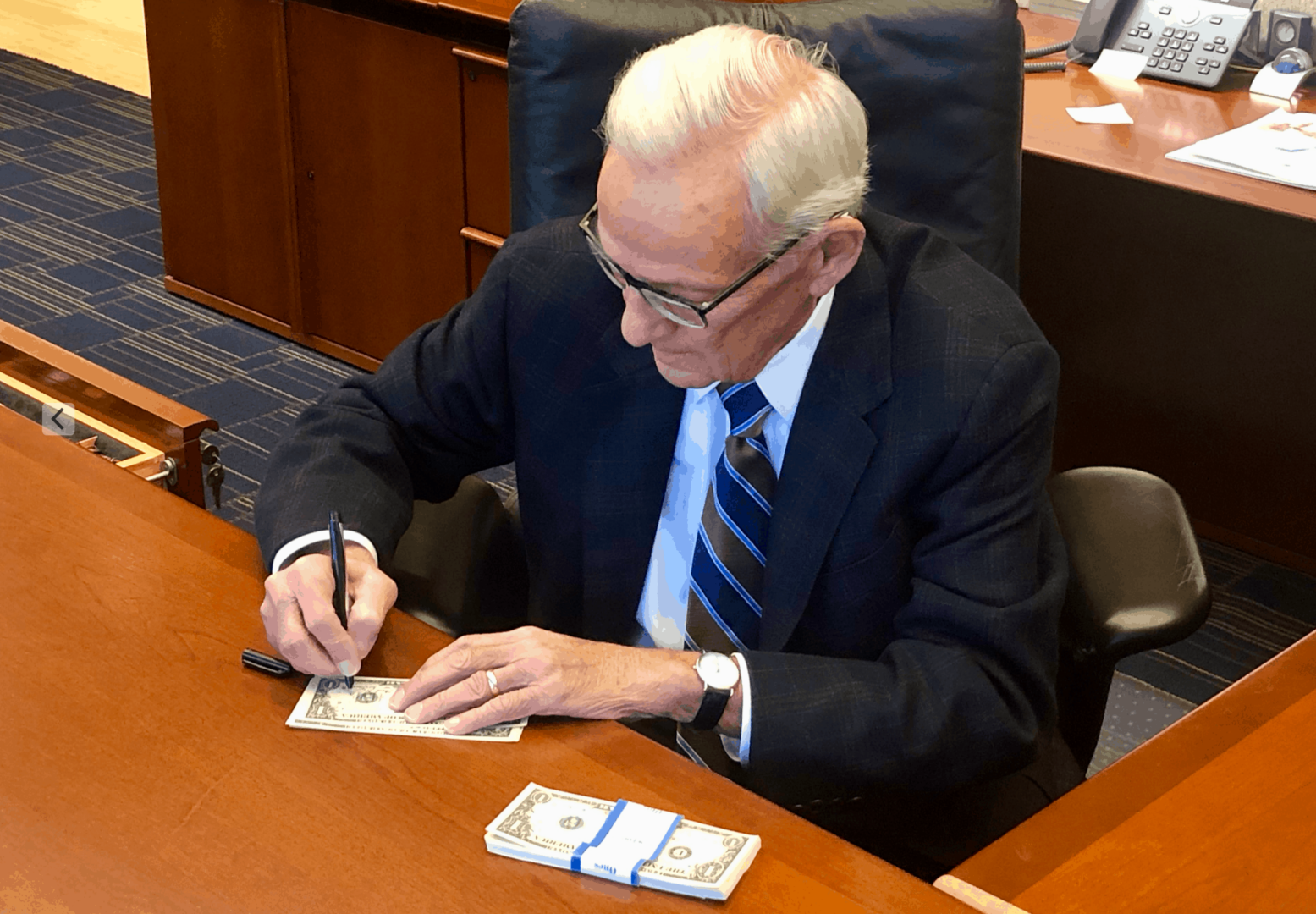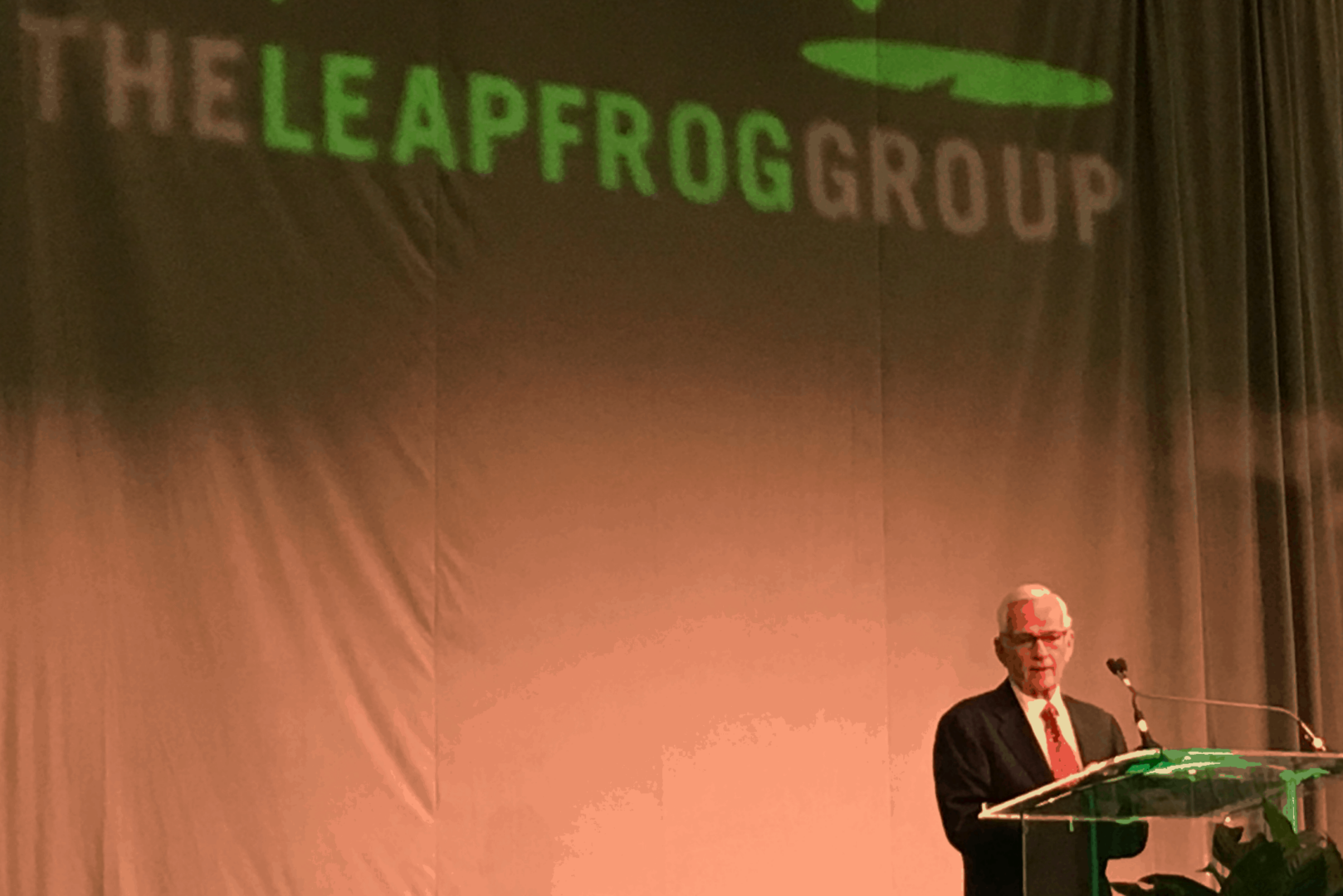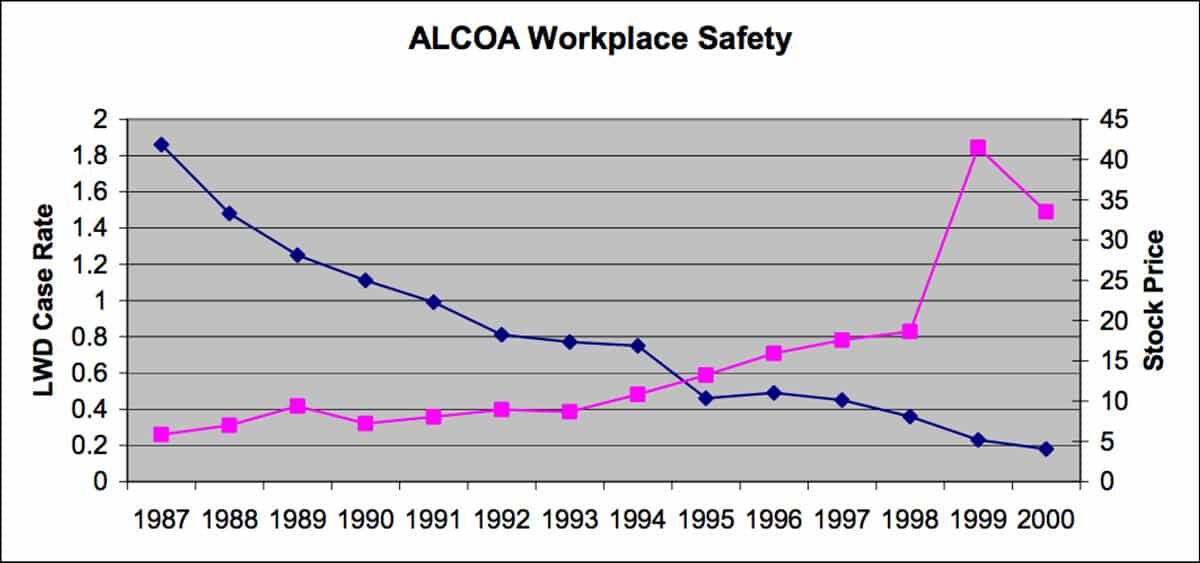
It was a sad weekend, hearing about the passing of Paul H O'Neill, Sr. on Saturday. He was 84.
I had the good fortune to meet and spend time with Mr. O'Neill on a few occasions and I'll share some reflections in this post. My condolences go out to his family and friends, and especially to my Value Capture colleagues who worked with him at Alcoa or at the firm over the past 15 years.
Here are his obituaries from the WSJ, the New York Times, and the Pittsburgh Post-Gazette. You can also read more about his life on a memorial page that his family set up and people are sharing memories there.
Hear Mark read this post — subscribe to Lean Blog Audio
The few times I got to meet him in person, I sadly never got a photo together with him. The last time, however, I was able to get some time with him was at the Value Capture office in Pittsburgh in 2018 (he was founder and non-executive chairman of the consulting firm).
He was always called “Mr. O'Neill” by the Value Capture team. I think it was always due to the immense amount of respect and love that they had for him as a person. Mr. O'Neill was not the type of guy who would make you call him that.
I always noticed that he was listed alphabetically just like the other Value Capture team members… I would guess he asked for that or people just knew that's what he would want.
As CEO of Alcoa, he famously built a new headquarters where everybody, including himself, got “81 square feet” of open cubicle space because he believed in the importance and dignity of every employee and every person.
I once heard him ask, in a talk:
“Do the people who clean the rooms get the same level of respect as the surgeons?”
You can see that and get a sense of his kindness and character in this video:
There's Mr. Rogers-type music in the video and he and Mr. O'Neill were both a part of Pittsburgh for a long time. Mr. O'Neill wasn't Mr. Rogers… but Mr. O'Neill, to me, had a resolute and serious, but calm, demeanor that both put you at ease and made you want to go out and do the best work possible with clients. He wasn't going to put pressure on us, but something about him made me not want to let him down.
Back to that last time seeing him… Mr. O'Neill would definitely not make you call him “Secretary O'Neill,” although he had earned that title when he served as Secretary of the Treasury under President George W. Bush.
He enjoyed sharing one perk that came with that office. His name was, of course, printed onto U.S. currency during his tenure (as you can see them talk about in the video, above). He was allowed to have real $1 bills that were specially printed with NO signature.
Mr. O'Neill could then ceremonially sign a bill to give away, as you can see below. He was seated at the desk in the cubicle that was his at the office.

That bill (and the commemorative holder) will be a cherished keepsake of mine — I'll have to get it framed with this photo and some of his words that mean so much to me.
The Nun and the Bureaucrat
I first became aware of Mr. O'Neill's interest (and influence) in healthcare from the book The Nun and the Bureaucrat, as I blogged about here back in 2006. He was said bureaucrat, of course. Read more here from my friend John Hunter's blog.
There was also a very good documentary that aired on many PBS stations, based on that book, called “Good News: How Hospitals Heal Themselves. “I have a DVD of it, but I'm not sure if it's available online anywhere. The DVD comes with the book when you buy it on Amazon.
The Importance of Safety
Mr. O'Neill has said (and, more importantly, done) many things that are inspiring in the name of worttheker safety and, later in his life, patient safety.
He famously made safety the primary public objective at Alcoa. Safety wasn't the only thing he cared about — but safety was the issue that everybody could rally around, a moral obligation.
As I heard him say in a talk, he told Wall Street analysts that safety numbers would be a “leading indicator” of how they were improving, in general. There was buzz that a CEO was talking to analysts about safety (this was, of course, a very unusual topic for a CEO to bring up).
He would say:
“With leadership, all things are possible. Without, nothing is possible.”
I asked him once, in a podcast interview, what the barrier was to improving safety and he said, without missing a beat:
“Leadership”
What did he mean by leadership?
I also once heard him say:
“Most organizations are just riding a log down a river.”
This quest for perfection required active leadership. Doing the things that are required to work toward zero harm then leads to what he called “habitual excellence.” One chapter in Charles Duhigg's book The Power of Habit explains this philosophy very well.
Here is an excerpt from that book:
How ‘Keystone Habits' Transformed a Corporation
Habitual excellence would help an organization work toward what he called “theoretical limits” (such as zero harm).
Mr. O'Neill didn't use safety as a slogan. He was deeply committed to that cause. After leaving the Bush administration, Mr. O'Neill co-founded the Pittsburgh Regional Health Initiative, as he discusses in this video:
He then founded the firm Value Capture and I've been fortunate to do some work through them the past few years.
Leaders are Responsible
One powerful idea that I've heard from Mr. O'Neill is that leaders are responsible for everything that happens in their organization — the positive and the negative.
We can't have leaders who want to take credit for the good and blame others for the bad.
This reminds me of what Dr. Deming said about senior leaders being responsible for the system. The system generates a vast majority of the outcomes and results in the business. Mr. O'Neill didn't think he could delegate safety to anybody under him and I respect that. I wish we saw more of that.
Two Speeches
I saw Mr. O'Neill give formal speeches about healthcare safety two times. The first was at the Lean Healthcare Transformation Summit in 2013. I hope video exists of that (I'm not sure) but I took notes that I shared in this blog post:
I also saw him give a speech at a Leapfrog Group event in Washington D.C. in 2015.

As I remember it, a few minutes into his talk, the hotel's fire alarm started going off. Of course, his first reaction was to encourage everybody to evacuate the ballroom and the hotel. He took the opportunity to lead by example instead of assuming it was a false alarm or being visibly annoyed by being interrupted.
Again, he wasn't all talk. At Alcoa, worker injury rates plummeted over time, as seen in this chart from the Value Capture website (read more):

When he gave his 2013 speech, that rate had gotten down to 0.065, even lower than it was in 2000.
Podcasting with Him
I had the very special opportunity to record a podcast with Mr. O'Neill, which was recorded by phone, in 2012 (and I revisited this in 2017). A transcript and notes are available too.
At Value Capture, I have been helping them establish a new podcast series (making use of time spent working at home). We were about to formally announce the podcast, but that will be on hold for now. But, we named the podcast “Habitual Excellence” in honor of Mr. O'Neill and his expression.
One thing we're going to do in the podcast is share audio from speeches that Mr. O'Neill gave, including this one:
That video is also part of a playlist that I created on YouTube. I've spent a lot of time with these recordings recently and I never get tired of listening to him talking on these subjects. I'm about to go for a walk and I'm going to listen to a Vimeo video that a colleague shared with me over the weekend.
His Three Questions
Mr. O'Neill always emphasized the importance of these three questions, as I blogged about in 2018. We should all be so fortunate as to be able to answer “yes” to these questions in the workplace:
1) “Can I say every day I am treated with dignity and respect by everyone I encounter without respect to my pay grade, or my title, or my race, or ethnicity or religious beliefs or gender?
2) Am I given the things I need – education, training, tools, encouragement – so I can make a contribution to this organization that gives meaning to my life?
3) Am I recognized for what I do by someone I care about?”
Mr. O'Neill had a lot of people who cared about him and he deserves the recognition and remembrances. You can read many wonderful stories on his memorial website.
Thank you, Mr. O'Neill for the example you set. Thank you for inspiring me to try to become a better leader and a better person.
Free eBooks
Updated 2021: You can read more about what O'Neill did as a leader to build a culture of safety — and how he influenced leaders in healthcare — in these two free eBooks from Value Capture:
A Playbook for Habitual Excellence: A Leader's Roadmap from the Life and Work of Paul H. O'Neill, Sr.
This is also available as a Kindle book or Paperback through Amazon.
Lasting Impact: Leaders Share Lessons from Paul H. O'Neill, Sr.
I hope you'll check them out.
Please scroll down (or click) to post a comment. Connect with me on LinkedIn.
Let’s build a culture of continuous improvement and psychological safety—together. If you're a leader aiming for lasting change (not just more projects), I help organizations:
- Engage people at all levels in sustainable improvement
- Shift from fear of mistakes to learning from them
- Apply Lean thinking in practical, people-centered ways
Interested in coaching or a keynote talk? Let’s talk.
Join me for a Lean Healthcare Accelerator Trip to Japan! Learn More










Here are reflections from a mutual friend, Dr. John Toussaint:
https://createvalue.org/blog/paul-oneill-important-person-life/
More thoughts from another friend, Dr. Paul DeChant:
Safety Is a Core Leadership Value
Nice thoughts from Prof. Steve Spear:
Comments are closed.